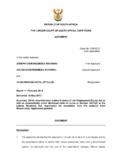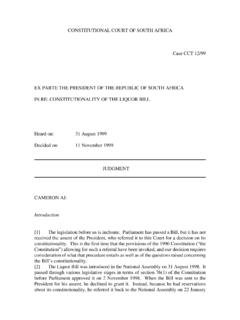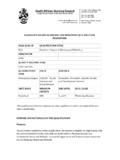Transcription of THE SUPREME COURT OF APPEAL REPUBLIC OF SOUTH …
1 THE SUPREME COURT OF APPEAL REPUBLIC OF SOUTH africa JUDGMENT CASE NO: 215/06 Reportable In the matter between JOHANN F LSCHER POTGIETER Appellant and ILSE POTGIETER Respondent Coram: Farlam, Cameron et Van Heerden JJA, Hancke et Theron AJJA Heard: 22 March 2007 Delivered: 30 March 2007 Summary: Divorce custody of minor children best interests of child paramount consideration factual findings made by trial COURT relating to parties parental capacity approach of APPEAL COURT to such factual findings expert evidence principles relevant to evaluation of Neutral citation: This judgment may be referred to as Potgieter v Potgieter [2007] SCA 47 (RSA) VAN HEERDEN JA: 2[1] The main issue in this APPEAL is the custody of two minor children, Engela and Johann Potgieter, now aged 15 and 11 years, respectively.
2 [2] The appellant, Dr Potgieter, is the father of the children and the respondent, Mrs Potgieter, is their mother. The parties were divorced on 26 October 2004 by order of the Port Elizabeth High COURT (Chetty J) and custody of the children was awarded to Mrs Potgieter, subject to reasonable access by Dr Potgieter as specified in the COURT order. Dr Potgieter was also ordered to pay maintenance in respect of the children, as well as rehabilitative maintenance for Mrs Potgieter in the amount of R4650 per month for 12 months.
3 [3] Chetty J refused Dr Potgieter s application for leave to APPEAL against the custody order and the costs order made against him, but this COURT subsequently granted leave to APPEAL to the Full COURT of the Eastern Cape Provincial Division. On 13 January 2006, the Full COURT (Erasmus J, with whom Maqubela AJ and Matthee AJ concurred) dismissed the APPEAL with costs. Dr Potgieter now appeals further with the special leave of this COURT . The APPEAL is directed against the custody order, the order for rehabilitative maintenance in favour of Mrs Potgieter and the costs orders granted against Dr Potgieter.
4 3[4] Dr Potgieter instituted divorce proceedings in February 2003, claiming custody of the two children, then aged ten years and 11 months and seven years and eight months, respectively. Mrs Potgieter opposed the divorce action and counterclaimed for (inter alia) custody of the children. [5] At the instance of Dr Potgieter, the trial COURT directed the family advocate (Ms Ren Claassen) to conduct an enquiry in terms of section 4(1) of the Mediation in Certain Divorce Matters Act 24 of 1987. She appointed Ms Helena Retief, a social worker and family counsellor, to conduct an investigation into the interests of the children as regards custody and access, and also engaged the services of Dr Estelle de Wit, a clinical psychologist, to undertake a psychological assessment of the children.
5 In their written reports and in their testimony during the trial, both Ms Retief and Dr de Wit recommended that custody of the children be awarded to Dr Potgieter, Mrs Potgieter to have restricted rights of access. On the basis of these reports, this was also the recommendation made by the family advocate. [6] At the insistence of Mrs Potgieter, a report was also obtained from a second clinical psychologist, Ms Carol Vogel. In this report, Ms Vogel agreed with the recommendations of Dr de Wit and Ms Retief in respect of custody and access. She was thereafter called by Dr Potgieter as his first 4witness during the trial.
6 Like Dr de Wit, Ms Vogel had administered a psychometric test known as the Minnesota Multiphasic Personality Inventory-2 (MMPI-2) to both parties. Based on the results of these tests, each clinical psychologist diagnosed Mrs Potgieter to be suffering from a borderline personality disorder manifesting itself in, amongst other things, impulsivity; a pattern of unstable and intense interpersonal relationships; abuse of prescription drugs; emotional instability and mood swings. [7] Dr Potgieter also called a psychiatrist, Dr Peter Crafford, to testify on his behalf at the trial.
7 Dr Crafford had treated Mrs Potgieter for anxiety and depression over a period of about five months some six years before the trial. He had also diagnosed her as suffering from marked borderline personality traits , with generalised personality disorder , panic disorder and recurrent major depressive disorder . According to Dr Crafford, although Mrs Potgieter had initially responded well to electro-convulsive therapy, the anti-depressants prescribed for her at that stage did not succeed in keeping her depression at bay. Dr Crafford opined that Mrs Potgieter had serious problems coping with reality and that her insight into her problems was very limited.
8 He was of the view that she did not have the strength of will to persevere with psychiatric treatment, nor was she motivated to undergo individual psychotherapy. He testified that Mrs Potgieter s generalised anxiety disorder was a lifelong condition and that, 5although it could be treated, was not curable. It was characterised by excessive uncontrollable worry; mood instability; inability to cope with change; the avoidance of stressors and the formation of inappropriately intense and unstable interpersonal relationships.
9 According to Dr Crafford, Mrs Potgieter s long-term prognosis was not good. [8] It is important to note that Dr de Wit and Ms Retief premised their recommendations to a large extent on their factual finding that the parties housekeeper, Ms Maria Zama, had been the children s primary caregiver for a number of years preceding the trial. I will return to this aspect in due course. So too, the family advocate accepted as a fact in her report the allegation that Ms Zama, and not Mrs Potgieter, was the children s primary caregiver. [9] The family advocate also called a third clinical psychologist, Mr Ian Meyer, to testify at the trial.
10 Mr Meyer had been instructed by Mrs Potgieter s attorneys during the course of the trial to conduct an investigation and compile a report, focussing in his assessment on the parties respective parental capacity. In accordance with his instructions, he did not reassess the children for fear of traumatising them by subjecting them to a further distressing psychological process. Mr Meyer was of the view that Dr Potgieter showed greater parental capacity than Mrs Potgieter 6and that custody of the children should be awarded to Dr Potgieter.













